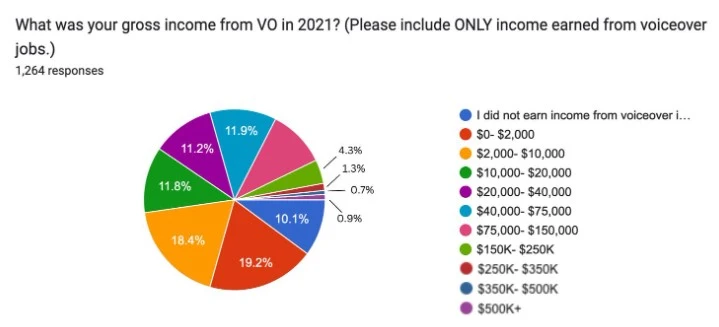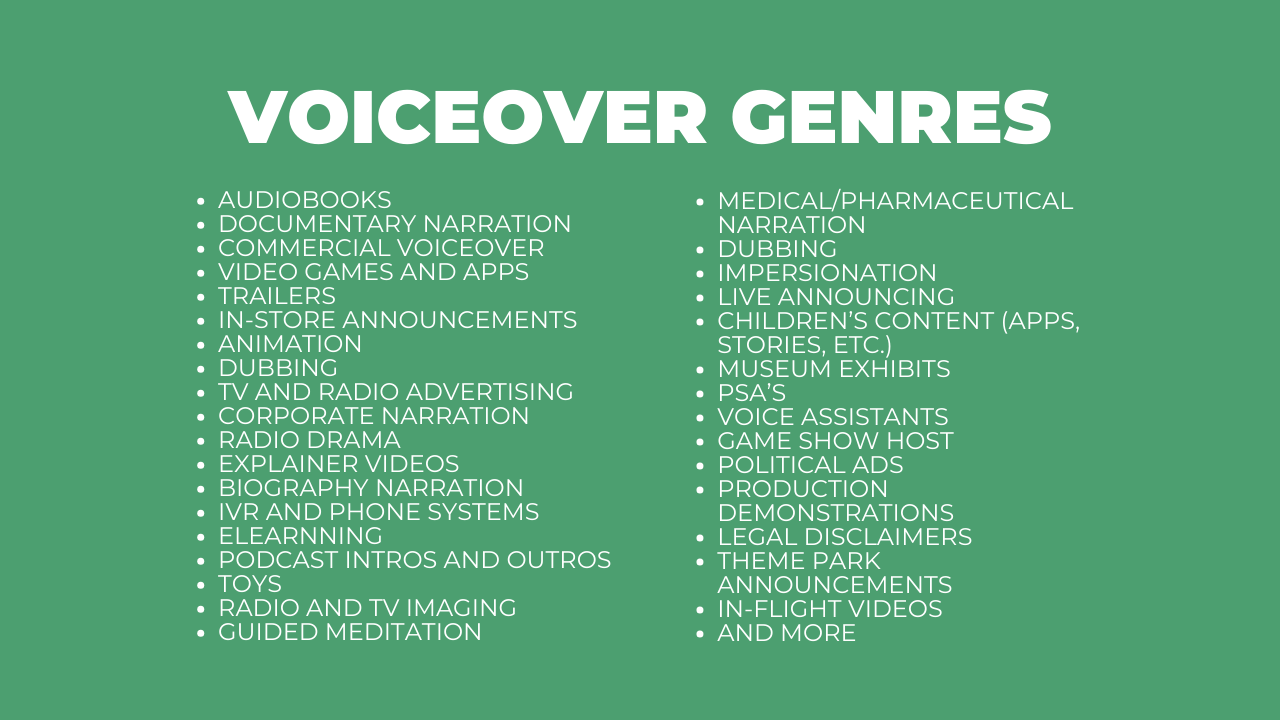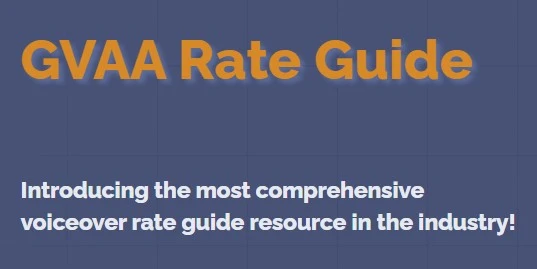Affiliate Disclaimer: I hope you love the products and services I recommend - I truly believe in them. Just so you know, I may collect a tiny compensation from the links on this page at no added cost to you. Thank you if you use my links, I really appreciate it!
“How much does a voice actor make?”
Here’s the short answer:
The earning potential of a professional voice actor can vary widely depending on factors such as experience, client budget, and voiceover genre.
According to a first-of-its-kind voiceover industry survey by NAVA (National Association of Voice Actors], 74.9% of voice actors said they earn $50,000 or less per year and 81.6% said they earn $75,000 or less per year (2024).
On the other hand, the upper limit of voice acting earning potential is very high ($10M+ per year).
It’s important to note that the survey results listed above may be somewhat misleading because there is no agreed-upon definition of a “working” or “full-time” voice actor within the industry.
*Important Note*
It is absolutely possible to earn a comfortable living as a voice actor. For example, I’ve been a full-time voice actor since 2012. Based on my experience and what I’ve seen over the years, making a comfortable living in VO requires these three things (at least):
- Some level off natural talent behind the mic
- Persistence in the face of rejection
- Time and money toward improving your skills, recording space, and business
Curious if this a viable career path for you?
Look no further than this comprehensive Voice Actor Salary Guide.
As a full-time voice actor (since 2012) who was once in your shoes, I know firsthand how important it is to get accurate and reliable information before you spend too much time or money on this career.
Just to get this out of the way quickly…
Because pro voice actors go from gig to gig (or job to job) throughout the year, there’s no such thing as a “yearly salary” in voice acting (in the traditional sense).
But that’s okay. There’s still a lot to unpack here.
In this guide, I uncover the truth about how much a voice actor earns, including what you can expect to make as a beginner voice actor.
I explore the important factors that can influence your pay, such as voiceover genre, voiceover experience, demand for your voice, and client type (often overlooked factor).
I also run through a realistic example of a working voice actor’s yearly earnings and how those earnings are broken down.
Plus, get access to the BRAND NEW VOICE ACTING SALARY CALCULATOR.
Whether you’re a beginner looking to break into the voice acting field or a seasoned professional who’s always learning, this guide’s got you covered.
BONUS VOICE OVER TIPS IN THIS GUIDE:
Key Takeaways
- Follow the basics of a successful voice acting career to maximize how much you can earn as a voice actor.
- According to a voiceover industry survey, over 70% of professional voice actors earn less than $50,000 per year (2024); however, this is somewhat misleading because there is no agreed-upon definition of a “working” or “full-time”.
- Voice actors can get paid very well per voiceover project.
- While it is difficult to succeed in voiceover, there is almost no limit to how much you can earn.
- Each genre of voiceover (audiobooks, animation, commercials, etc.) has a different pay structure and/or pay scale.
- Several factors affect how much money a voiceover talent can make, including experience, niche, demand, location, client budget, and more.
- Beginner voice actors should plan on making less than $10,000 in their first year (or two). Some may make much more, some much less.
- Many factors affect the earning potential of a beginner voice actor, including marketing ability, skills, and voiceover sound quality.
- There are many places to start looking for your first (or next) voiceover client today. Look at the list below to learn more.
Basics Of A Lucrative Voice Acting Career

Before we talk about how much you can earn as a voice actor, let’s cover the basics of a successful voice acting career.
Voice acting is all about using your voice to give life to characters, narrate stories, and add flavor to all sorts of projects like cartoons, video games, commercials, training videos, and more.
But before you start making some real money in voiceover, you MUST cover the basics below.
High-Paying Voice Acting Career Checklist
Attend voiceover-specific performance classes.
Record a killer voiceover demo.
Set up a quiet home voiceover studio.
Learn how to record, edit, and deliver high-quality voiceover files for clients and agents.
Market your services to high-paying voiceover clients through your voiceover website, email, cold calls, and other methods.
It can be really hard to know how to invest your hard-earned time and money, so make sure you learn how to prioritize spending when you’re just getting started in voice acting.
Overall, success in this industry is about continuously improving your skills, putting yourself out there, and staying persistent.
Professional voice acting can be a tough nut to crack, but with dedication and killer VO skills, you can make this flexible and fun career a reality.
HOW MUCH DOES A VOICE ACTOR EARN?
According to a first-of-its-kind voiceover industry survey by NAVA (National Association of Voice Actors], 74.9% of voice actors said they earn $50,000 or less per year and 81.6% said they earn $75,000 or less per year (2024)
You can see how the earnings are broken down as a percentage of respondents in the NAVA 2021 gross voiceover income survey results here:

Compare that to the 2021 overall median personal income of $40,460 and you’ll quickly see that the majority of self-described voice actors make at or below the median personal income level in the United States.
At least according to the NAVA industry industry.
On the other hand, ZipRecruiter says that the average voice actor salary is $100,198.
Wait, what? Who are you supposed to believe?
You see…
Voice acting is gig work.
Voice actors don’t earn a “salary”.
Just like on-stage or on-screen acting, voice actors go from one short-term job (or gig) to the next.
Unlike traditional jobs with yearly salaries (engineering, teaching, nursing, etc.) that are easily tracked, voice acting is a freelance job where the earnings are all over the place.
And there’s no agreed-upon definition of what a “working voice actor” really is.
Some people do it as a hobby.
Some people get into voiceover to earn some secondary income.
Some people do it alongside their normal 9 to 5 job, hoping to one day quit that job and do voiceovers full-time.
And some people have been voicing full-time for years (I fall into this bucket).
Even the term “full-time” isn’t fully agreed upon within the industry.
Want to start a successful voice acting career from scratch?
Download the FREE Voice Acting Career Launch Kit below. It includes a career-building checklist, links to suggested beginner-friendly recording equipment, and advice for finding the PERFECT voiceover performance coach (p.s. I’m not a VO performance coach.).
No pressure at all, but I think you’ll really like the guide.
Voice Acting Average Salary
The idea of a voice acting “average salary” is a myth.
As I said above, there’s no agreed-upon definition of what a “working voice actor” or “full-time voice talent” really is which makes it almost impossible to figure out what the “average” voice actor earns per year.
You’re probably thinking…
“Annoying answer, John.”
Yea, I get it.
Keep reading to get a better grasp of what you can expect to earn as a voice actor.
Do Voice Actors Get Paid Well?
Yes. While it is challenging to find success in voice acting, it can be highly lucrative for those who have the talent, skill, and determination to succeed.
For example, Nancy Cartwright (Voice of Bart Simpson on The Simpsons) makes at least $315,000 per episode of The Simpsons, according to Variety.
Multiply that by 22 episodes per season and she makes at least $6.93M per season.
And that’s just ONE project.
She could be working on several projects at once.
The earning potential in voiceover is very high and is only limited by the amount of time you have in a day (and your ability to find work).
However, Ms. Cartwright is an outlier.
It is rare to become ultra-rich and famous in this field.
I’ve been doing this full-time since 2012 and I’m not famous or super rich.
But I’ve made a comfortable, rock-solid living which helps support a family of 4.
And it gives me the flexibility and freedom I desire that I wouldn’t get doing a traditional 9-5 job.
In fact, flexibility is one of the 5 reasons you should get into voiceovers.
You see, there are many paths to earning a comfortable living doing VO full-time.
It simply takes adequate time, training, effort, and financial investment to make it happen.
How Much Do Voice Actors Make An Hour?
Working voice actors typically get paid on a per-project, per-session, or per-word basis. So, average hourly pay doesn’t exist in the traditional sense.
The better question to ask is…
How Much Do Voice Actors Make Per Project?
The MINIMUM industry standard pay rate is around $300-$450 per project (or session), according to the GVAA (Global Voice Acting Academy) Voiceover Rate Guide.
Keep in mind that this is “in general”. Because like many things in voiceover, per project pay rate can vary WILDLY from one project or voice actor to the next.
Voiceover sessions* (and projects) can last anywhere from 5 minutes to 5+ hours (or much more).
As a non-union voice actor (like me), you get to set your own voiceover rates.
(More on the voiceover union in a little bit.)
Rates can be higher or lower than industry standard rates.
It’s all up to you.
There is a lot of career flexibility within the non-union VO world which is why I’ve stuck with it in my career.
But this flexibility can be dangerous for aspiring and newer voice actors which is one of the five reasons you should NOT get into voiceovers.
It’s easy to fall prey to accepting low or no-pay work just to get some experience or say that you’re doing VO.
This can be frustrating early on and can really hurt your chances of making this a viable long-term career.
Plus, accepting low rates can lead to lower voiceover rates industry-wide.
In other words, it hurts everyone else, too. You don’t wanna be that person.
On the flip side, the voiceover union (SAG-AFTRA) sets union voiceover rates for every project and clients must adhere to those rates.
You can even convert non-union work to union voiceover work if you decide to go the union route:
There’s some safety in the voiceover union (and healthcare and retirement benefits which are huge), but you also have to pay union fees and work within the parameters of the union which can be somewhat limiting at times.
*Important Note: Please keep in mind that most professional voiceover projects now require you to fully edit, format, and deliver the audio on your own from your home voiceover studio. <= Be sure to read this comprehensive home studio beginner’s guide if you’re just getting started.
Pay Rates Within Different Genres of Voiceover
Curious about how much an audiobook narrator can make? Or maybe the voices you hear on Saturday morning cartoons?

There are a lot of different voiceover genres within the voice acting industry, including:
- Audiobooks
- Animation
- TV, Radio, and Online Commercials
- TV and Radio Promo Work
- eLearning Narration
- Sales Videos
- Explainer Videos
- On-Hold Messaging
- Live Event Announcing
- Dubbing
- ADR
- Theme Park Announcements
- In-Store Announcements
- Toys
The list goes on and on…
Each genre pays differently, so it’s difficult to give you an apples-to-apples comparison from one genre to the next.
That’s because the pay structure can vary (per minute, per word, per hour, by broadcast usage, per voiceover session, etc.).
The numbers below* give you a ballpark idea of how much you can expect to earn within each genre of voiceover on a per-project (or word or session) basis:
*Rates are pulled from the GVAA Rate Guide.
Audiobook Narrator Voiceover Rates
$200 – $500 per finished hour (Finished hour means fully recorded, edited, formatted, and delivered hour of finished audio, NOT hour of work)
TV, Radio, and Online Commercial Voiceover Rates
$300 – $3,500+ per commercial spot (rate widely varies depending on usage)
eLearning Voiceover Rates
$0.20 – $0.35 per word (finished audio – fully recorded, edited, formatted, and delivered)
Corporate & Industrial Narration Voiceover Rates
$350-$2,000+ per project
Animation & Dubbing Voiceover Rates
$1,000 – $1,025 per Session (11-22 minute episode)
OR
$75 – $200 per hour (2 hour minimum)
Explainer Video Voiceover Rates
$300-$525+ per project
Video Game Voiceover Rates
$200 – $350/hour (2 or 4 hour minimum)
Toys & Games Voiceover Rates
$500-$750 (up to 2 hour session)
Promo & Imaging Voiceover Rates
$150 – $2,000+ (depending on usage and market)
IVR Voiceover Rates
$150 minimum + $1/prompt up to $200 + $5/prompt
Cinema & Events Voiceover Rates
$300 – $3,000 (depending on usage and market)
Factors That Determine A Voice Actor’s Earnings

Voiceover Experience
Voice actors with more years of experience generally earn higher rates. As they build their reputation and portfolio, they become more sought after by clients and can negotiate better pay.
Niche Specialization
Voice actors who specialize in a specific genre or industry, such as commercial voiceovers or audiobook narration, can often command higher rates due to their expertise and portfolio within that genre.
Specific Voiceover Genre
Each genre comes with different pay rates and structures. For example, voice actors who do commercial work (TV, radio, and online ads) usually earn more “per word” than someone who mostly works in e-Learning. But it’s often much more competitive and difficult to book commercial work than e-Learning work and e-learning work can be a steadier income stream.
Voiceover Genre Demand
The demand for voice actors in different genres can vary, which can impact earnings.
Geographical Location
Voice actors based in major cities or regions with a strong entertainment industry presence may have more local opportunities and higher earning potential compared to those in smaller markets. However, being in a large voiceover market is not nearly as important anymore as home studios and remote recording have become more prevalent.
Union Affiliation (Possible Factor)
Being a member of a voice actors’ union, such as SAG-AFTRA, can provide additional benefits (like residuals) and ensure that voice actors receive fair compensation for their work. This does NOT mean non-union voice actors can’t command high rates.
Client Budget
Larger companies can often have a bigger budget set aside for voiceover which means they can often handle paying on the high end of rates within each genre of VO. But this is not always true. If you want to earn good money as a voice actor, you need to find quality clients with larger budgets, if possible, which leads to the next factor.
(OFTEN OVERLOOKED) WHERE You Find Voiceover Jobs
You need to target high-paying clients and avoid low-paying ones. This is a simple idea but many aspiring voice actors don’t think about it. Pay-to-play and freelance websites (like Voices.com and Fiverr) are overflowing with some of the cheapest clients imaginable. There are good ones but they’re difficult to find.
These sites are attractive to aspiring voice actors but the competition is fierce and the rates are shockingly low. You’ll be banging your head against the wall with how infrequently you get voiceover jobs and how little you make per project. Avoid these sites if you can and target higher-paying clients.
How Much Do Beginning Voice Actors Make?

For beginning voice actors, the earning potential can be much more modest compared to seasoned professionals.
After you cover the basics of becoming a successful pro voice actor, plan on earning less than $10,000 (probably far less) in your first year or two as a beginning voice actor.
I say this to give you a dose of reality and a realistic vision of what the early days could bring.
That might not be you. You might earn much more than that.
Or far less. And that’s okay, too. It’s a slow-moving process for most.
But once you land a few high-paying clients, the jobs can start to snowball because each client is a possible source of multiple voiceover jobs.
I call this the “Tree Branch Effect”. Once you’ve grown a thick, strong trunk (training, demos, marketing skills, etc.), you can start to grow branches (clients). And each branch gives you a shot at leaves (voiceover jobs).
Many other factors contribute to the initial earnings of a beginner voice actor, including:
Voice Acting Skill Level
Beginners may still be developing their skills and gaining experience, which can impact their earning potential. As they improve and build their portfolio, they can increase their rates.
Marketing Ability
Building connections with voiceover buyers within the industry is crucial for beginners to secure opportunities and gain exposure. Networking can lead to referrals and collaborations that can help increase earning potential.
Customer Service And Sound Quality
Delivering high-quality, consistent voiceover files on time and on budget is essential for building a loyal customer base.
While beginning voice actors may start with lower earning potential, it’s important to focus on gaining experience, improving skills, and building a strong portfolio. With time and dedication, earnings can increase significantly.
EARLY VOICEOVER CAREER WARNING:
Just because you are a “beginner” does NOT mean you should charge lowball rates for your work. If you’ve invested adequate time and money into your sound and skills, you should charge like a pro. Because you ARE a pro.
Example Voice Actor Salary Breakdown
Let’s go through an example of what a reasonable income could look like for a working, full-time voice actor.
We’ll call them Sam.
For simplicity’s sake, let’s say Sam only voices commercials (radio and TV ads) and tons of e-learning and training modules.
Most VO pros work in more genres than that, but there usually is some specialization like this.
(For example, I mostly voice online explainer videos, TV/Radio commercials, sales videos, and training videos.)
On average, Sam books about 35 commercial spots per year:
18 local spots ($400 on average per spot)
15 regional spots ($800)
2 national spots ($2,000)
TOTAL: $23,200
On average, Sam narrates about 150,000 words of e-learning per year:
150,000 words ($0.30 on average per word)
TOTAL: $45,000
SAM’S YEARLY EARNINGS: $68,200
As you can see, Sam earns a respectable income. He’s not rich, but he also lives a very flexible, balanced lifestyle where he’s the boss. And he gets to do what he loves.
He also has several loyal clients that he can count on to give him consistent work.
In the meantime, he’s consistently growing his client base through direct marketing, client referrals, and social media outreach, so there’s no reason why this income can’t increase as time goes on.
BONUS: VOICE ACTING SALARY CALCULATOR
Want a rough idea of how much you could make per year as a pro voice actor?
Use the Voice Acting Salary Calculator to get some quick answers NOW.
BONUS VOICE OVER CAREER ADVICE
Where To Find Voiceover Clients And Networking Opportunities
Online Casting Platforms
Reputable voiceover marketplaces like Bodalgo.com connect voice actors with clients looking for talent. These platforms allow you to create a profile, upload your demos, and audition for various projects. (AVOID sites like Voices.com and Fiverr.)
Directories and Databases
Directories like ProductionHub or Mandy.com can be excellent places to create a profile, list your services, and search for companies that may hire professional voice actors (video producers, copywriters, etc.).
Industry Events and Conferences
Attend voice acting conferences, workshops, and industry events to network with fellow professionals and gain exposure to their network. I’ve frequently referred my clients to other voice actors I know that better match their project’s needs.
Social Media
Utilize social media platforms such as LinkedIn, Twitter, and Facebook to connect with fellow voice actors. More importantly, you should connect and develop relationships with potential voiceover buyers.
By utilizing these resources and actively seeking opportunities, you can increase your visibility, connect with industry professionals, and possibly find your next (or first) voiceover job.
Conclusion: Putting It Together
There is no such thing as an “average” voice acting salary or yearly earnings because there is no agreed-upon definition of an “average” or even “full-time” voice actor.
The earning potential of a professional voice actor can vary widely depending on factors such as experience, client budget, and voiceover genre.
While it’s possible to earn a substantial income as a voice actor, success in this field requires talent, dedication, and continuous professional development.
It is essential to understand that it will likely be difficult to generate a consistent income as a beginning voice actor.
As long as you continue to improve, set fair rates, and consistently seek opportunities, you can pave the way for a long and successful voice acting career.
Good luck on your voiceover journey!
Your VO bud,
p.s. What questions do you still have about how much a voice actor earns?
Write your question below and I’ll respond ASAP.
Want weekly advice (like this article) on how to build a successful voiceover career?
Join 180+ aspiring and working VO pros and sign up below.
No pressure at all but I think you’ll like it.


